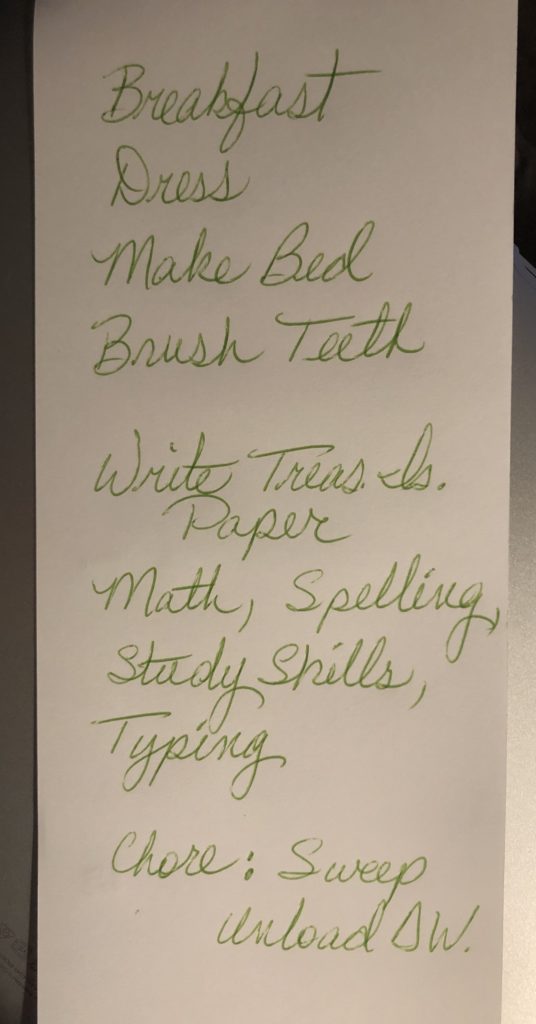5 Tips to Do School at Home

Schools have already begun conducting classes online in different venues and sending out assignments. Some of my teacher friends have just finished setting up all their lessons. Regardless of where your child’s school is in the process, you will be tasked with making sure the lessons happen. Here are five tips to help you and your kids keep your sanity while getting school done at home.
Make a ListM
Make a list of the things that absolutely must to get done. This is what our list looked like today.

The kid that this list belongs to gets to choose the order in which things get done. Well, all but the first four on the list. The first four items on the list are required in the first hour of being awake. For one of my kids that is 8 AM, because she is an early riser. For the other two that may be 8:30 or 9 AM. They are
all teenagers and although sleeping in is a thing,
even this mom has her limits. But after the first four
items are complete they get to choose the order in
which the rest of the day happens.
For younger children, you may have to give more direction, especially if they have specific times to be online for a lesson or Zoom meeting with a class. Read more about a school day at home with elementary aged children here.
Remove Distractions
Each student’s brain learns to operate within a school environment. If the child is used to operating in a classroom setting with other children around and scheduled time in their desks, plopping him in a new environment and expecting him to concentrate may not be a realistic expectation. So, to improve the learning environment, remove distractions.
Unfortunately, some distractions are discovered only by trial and error. That is the case for the first four items on the list pictured above. Lots of observation and trying different routines in the morning has helped to develop the first four. Staying in pjs and not making the bed makes some teenagers want to crawl back in and go to sleep. Other distractions however, are obvious. Please consider these as merely suggestions. They may not work for everyone. This is where trial and error comes in.
The TV or a gaming system can be a huge distraction. “Outta sight, outta mind,” is the best solution here. They don’t see TVs or gaming systems at school and we are simply trying to create an effective learning space. Sitting at the kitchen table where they do not see these things may be an option. Of course, if they have a desk in their room, that is an option, unless there is a TV or gaming system in their room also. The decision here depends on the teenager. Just be observant, talk with them about parameters and partner together to create a learning space that works for both of you.
For some children, the kitchen is distracting because it makes them think about eating, or the fact that they “think” they are hungry. This is the reason for another one of the first four items on the list – brushing your teeth. This habit in the morning helps get taste buds free and clear of lingering food taste. Some scientists believe it helps to lessen cravings.
Your child will most likely not be able to communicate any of these distractions to you, so observe them. For teenagers, watch while they work to know if relocating their workspace is a necessity. Observe when they are tired. You may need to adjust their diet. Most kids need less sugar and carbs in their diet as a general rule. Simply be observant, and you will see where the distractions lie.
Talk through cellphone usage and restrictions. In some classes, they are allowed to use their phone and in other classes it is strictly prohibited. If you are tasked at home with making sure the lessons happen, adopt the school’s cellphone policies. If your child is more familiar with a learning environment where cellphones are not permitted, put restrictions on them at home, at least while they are doing school work.
If you live in an apartment or a smaller home, the kitchen table may be your only option. Fantastic. There are still things you can do to remove distractions. For example, make sure that no food or packaging is in view. It could be that toys are distracting. It is only important that they be removed from the area where school needs to take place.
One distraction could be younger siblings. Read, here, how to accomplish school with with toddlers or Pre-K aged children around.
Operate with Grace
Remind yourself often that this whole situation is different for your kids but that it is also different for you. Operate with grace in everything. No offense intended here at all, but YOU are the adult. Set the rules that need to be set, and let go when your instincts tell you to let go. Trust your instinct to let the bed making go one day. Trust your instinct on the day you feel the need to do school in pajamas. Trust your instinct when the weather is warmer to do reading on a blanket in the yard or math on the patio.
For my household, once the first four items are checked off of the list above, the rest of the day is fluid. The list needs to happen, but where and in what order can be open for discussion. Maybe your household operates better on a rigid schedule. That is ok. A schedules is simply a tool we use to be productive.
Even though school is happening in a different location, learning can still take place. It can be fun and creative without being overwhelming to you.
Let It Go
Let go of the insecurity that you might not be able to help your child if they have a question. Most teachers have set up resources or times for kids to contact them with questions. Have your child write down any questions they have so that they are only contacting the teacher once and not several times a day. Ask them to remember that teachers have many students for whom they are answering questions.
Let go of a clean house. When you stay on top of making sure that your children are doing their school work, sometimes that doesn’t allow for the cleanest house. Decide what is most important to be done daily versus weekly. Those decisions can feel kicked up a notch if you are also working from home. Keep the motivation but let the stress go. We are all quarantined and no one is grading you. Remember the goal: to survive CO-VID 19.
If you are working from home, remember learning environment. If you have a meeting scheduled, prepare by following these suggestions.
Block meeting times with your kids, meaning let them know when you have important meetings taking place. This is the best example of the fluid schedule. Your child’s reading assignment is the type of activity that would be saved for the time of day the meeting is scheduled. Approximately 10 minutes before the meeting, check on everyone and let them know your meeting is about to start. Explain that you will come and tell them when it is over. In school, work is assigned where they are not allowed to talk to others and must work on their own. This ability, of course, varies based on age and whether or not learning glitches are present. But all grades are taught on some level to have a time of working at their desk by themselves.
Quiet Time
If you do not have to worry about meetings being scheduled, make sure to have a time in your home each day that is quiet. This a great time for kids to read a book or take a nap (even my teenagers, every once in a blue moon, will choose to take a nap instead of read). This may not happen everyday, but as many days as you can make it happen, it will be beneficial to your family. Surprise them by having quiet time in a different way: reading in the hammock or swing set, or if it is raining making a blanket fort to read in. Teenagers enjoy going to read at a coffee shop. So create a coffee shop at your kitchen table. Being faithful to a quiet time is, in my opinion, hard in the beginning, especially when it is not your norm. However, it could end up being your most treasured time each day.
You Can Do It
You can do this. Talk to friends and find out what is working for them. Let your kids talk with their friends. With all of our technology, we do not have to be isolated. But this time is also proving to us the reason we need to put down technology and treasure our relationships.
Hang in there!
If your school is NOT providing lessons or instructions for your children, here is post that might help occupy the days.



8 Comments
Comments are closed.